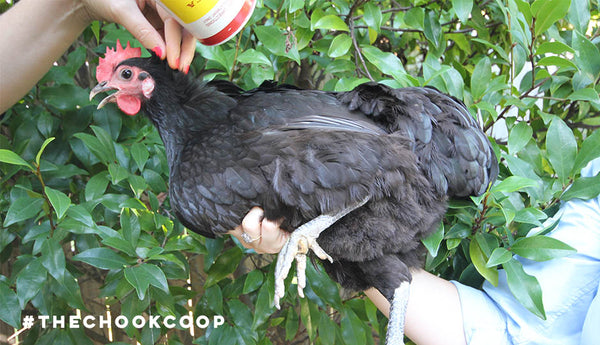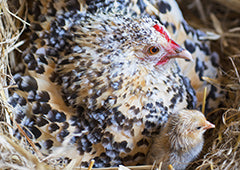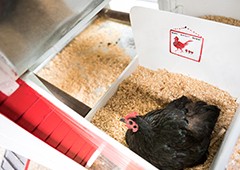You’ve got a beautiful flock of hens, and a healthy supply of eggs everyday - but who’s putting the hard yards in? It can be hard to tell if you don’t catch them in the act!
Here are some ways to tell which hens are the egg-cellent layers of the bunch.
Tell-Tale Signs That Eggs Are Afoot:
-
Pale Legs
If your girl is a productive worker, then her normally yellow legs may be quite pale.This is because the pigment used in a chickens yellow legs is diverted to make the golden yolk when a hen is laying! In comparison, anyone who’s not laying will have quite vivid coloured pins.
-
Red Comb
The hens comb is also a good indicator or laying activity - layers will have a bright red, plump comb whereas non-layers will have a smaller, duller comb.
-
Squatting
If you approach your hens and lightly stroke or touch them, prospective layers will do a submissive ‘squat’.
-
Breastbone
If you feel around an egg laying chickens breastbone, it should be quite large - around 4 fingers in width. Their abdomen will be about 3 fingers in width. This will be less for non-layers.
-
Personality
A productive layer will look alive! They’ll be very alert and have wide eyes. If your hens are looking a little lazy or listless, then they’re probably not the ones putting in the hard yards.
How To Encourage Laying
If you bought your hens at point-of-lay but haven’t seen any produce as of yet, here are some tips and tricks to help get the show on the road. This won’t guarantee that they’ll start pumping out eggs pronto - sometimes they won’t lay until they’re good and ready!
-
Keep them well fed and watered
Keep your flock well fed with a healthy diet of layer rations (as long as their at least 19 weeks of age). This has more calcium in it, which is essential for any hard working girls producing lots of delicious eggs! Also ensure that your hens have access to clean, fresh water. If they don’t, they actually won’t be able to produce any eggs at all.
Giving them an extra calcium boost by adding shell grit or crushed egg shells to their diet is also advisable - it keeps their eggs and their bones strong.
-
Ensure there are enough nesting boxes for everyone
There needs to be ample nesting box space for your hens to want to lay - also, it doesn’t hurt to make conditions a little comfy for them! Line the nesting box with some cozy straw to make it inviting - you can even stick a fake ‘egg’ (i.e. golf ball) into the nesting box to encourage laying behaviour!
You can make nesting boxes even cozier by stringing up some curtains around it - chickens need their laying environment to be dark and private.
-
Stress your hens less!
Stress-free hens are happy, productive layers. If your chooks are under the pump, then they’re less likely to provide fresh eggs. Check out our ‘How To Help Your Hens Stress Less’ article for more information on keeping the flock cool, calm and collected.
If you look after your hens, keep them healthy and well fed, then your hens should provide you with lots of delicious eggs - unless there’s some sort of pre-disposed medical or physiological reason beyond your control.
By housing your chicken in a secure, safe and spacious coop such as the Taj Mahal, Penthouse and Mansion, you’ve already set yourself on the path to finding fresh eggs in your nesting boxes daily!
As well as these great ways to encourage egg-laying, there are other behaviours that might be reducing the egg production rate. From eating their own eggs to not nesting in their boxes, there are habits that can be frustrating for keepers and harmful to your flock. Like all pets, chickens can be trained to stop bad habits and reinforce positive ones.
Cluckily, our friends over at Chickenpedia have created an amazing Chicken Etiquette Course. This extensive online course shares useful advice on a variety of chicken behaviours. The well-structured course will also help you deal with bad behaviour and encourage positive behaviours. Keep the neighbours happy - their only complaint will be that they wish they also had chickens!
Learn how to have the best-behaved chickens in town with this beginner-friendly course. This is why I highly recommend Chickenpedia’s courses to all of my readers! They are filled with vital information that help you raise a happy, healthy flock.
Click here to check out Chickenpedia today!




















